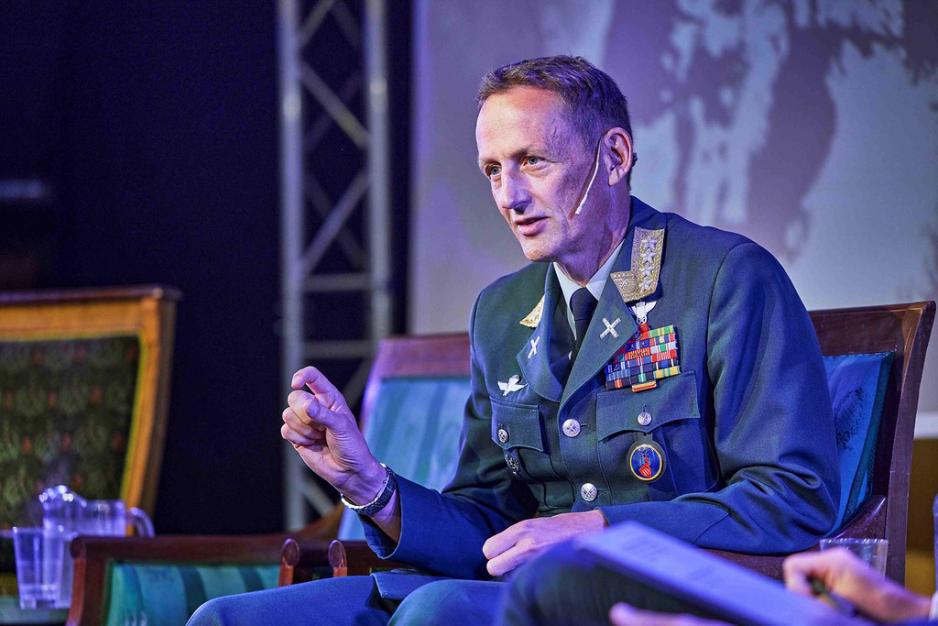Arne O. Holm says When Generals Move Gas Cans Away From a Flaming Fire

The Norwegian Chief of Defense Eirik Kristoffersen participated in a talk during the Arctic Security Conference 2025, organized by the Fridtjof Nansen Institute, the High North Center for Business and Governance at Nord University, and UiT, the Arctic University of Norway, among others. (Photo: Bård Gudim/FNI)
Comment (Oslo): "We cannot protect ourselves against everything," said the Norwegian Chief of Defense, Eirik Kristoffersen, providing a room full of international academics with Arctic expertise a crash course in democracy. "You can give me more power. But I don't want it."
This is an opinion piece written by a member of the editorial staff. All views expressed are the author's own.
It's been a long time since the hawks of security policy consisted of generals and chiefs of defense. The hawks sit in the political administrations in Washington or Moscow. Thus, it might not be that surprising that a Norwegian defense chief decides to move the gas can a few necessary meters away from the fire burning in Ukraine and on the Gaza Strip.
He knows better than most how fast fires spread.
Scary
Both he and the politicians on stage at the Fridtjof Nansen Institute's Arctic Security Conference know that the choice of words matters when reality is to be described.
The Norwegian Minister of Foreign Affairs, Espen Barth Eide, was also aware of this when he opened the conference. Communicating the threats we are facing without unnecessarily increasing fear is a demanding exercise.
Political opponents nodding approvingly.
When PM Jonas Gahr Støre asked us a while back to be prepared for war, it was a powerful, but necessary shift in rhetoric on the security policy situation, particularly in the North.
I have quoted him on this in previous comments, and I notice from the feedback from our readers that the wording can be intimidating. Of course it can.
Perhaps that is why MFA Espen Barth Eide chose different phrasing when he took the stage during the Arctic conference in Oslo.
"We have a potentially difficult time ahead," said Eide.
Its meaning is the same, but the wrapping is somewhat gentler. Because, as he also said:
"We cannot say that there is low tension in the North."
Listen to the president.
The Conservatives' experienced politician and former MFA Ine Eriksen Søreide sat at Barth Eide's side.
At a time when American republicans are calling their opponents, the democrats, traitors who should be arrested, there is something beautiful in political opponents nodding approvingly to each other's arguments regarding foreign and security policy.
Listen to the president
But if we who live in the still democratic part of Europe can embellish ourselves with democratic processes, the situation is quite another across the Atlantic.
USA's former Arctic ambassador, Michael Sfraga, was fired when Trump returned to the presidential chair, and was challenged regarding what one should believe in American foreign policy.
"Listen to the president," was his advice when he was asked whether the US is still fighting to take over Greenland from Denmark.
"Greenland may have gone from news headlines, but it is not gone from American foreign policy."
As a newspaper, High North News is also participating in the conference by inviting to a discussion about the significance of journalism in storytelling about the North. What words or issues we choose when we are to describe the world as it looks from within the Arctic.
Several underlined the need for schooling both nationally and internationally, including Anu Fredrikson, Director of another major High North conference, Arctic Frontiers.
But back to the introduction and Defense Chief Eirik Kristoffersen. When asked what our time's greatest threat is, the defense chief answered climate change. For many, an unexpected reply from a general. The second greatest threat was nuclear threats.
He believed that these threats were overshadowed by the complex hybrid threats.
Nothing new
"Hybrid threats are nothing new," he explained, and continued by saying that we would undoubtedly experience such threats again.
"But we cannot protect ourselves against everything. No one wants to live in a country in which the defense chief and chief of police govern their lives. We want to live in a democracy. One of the biggest challenges is when we start to blame ourselves and not our enemies. This is about how we respond to threats. You can give me more power, but I don't want it. That is not the kind of society that we want."
That is how a chief of defense can quite succinctly describe one of democracy's dilemmas. We may be able to both technically and politically secure ourselves against most threats.
Securing democracy is a far more demanding task. And also the most important.


